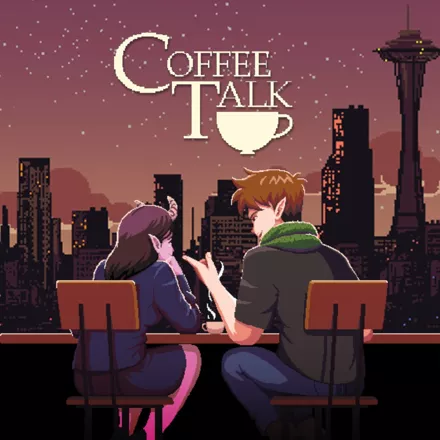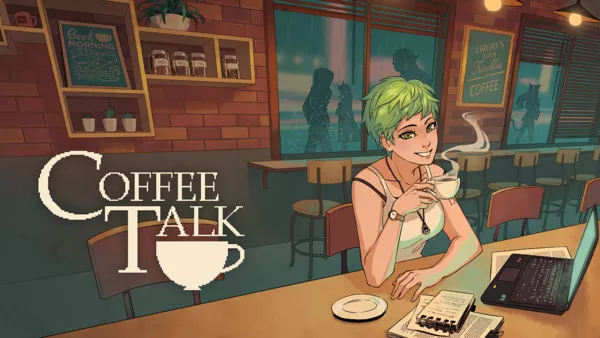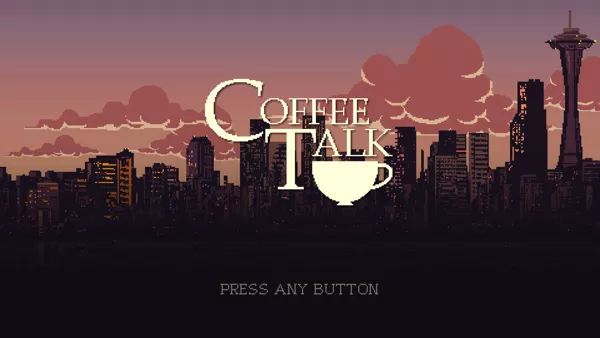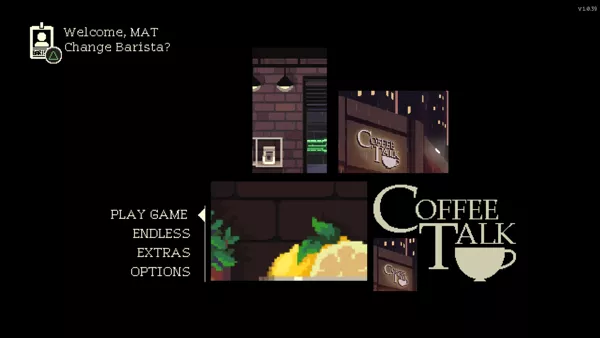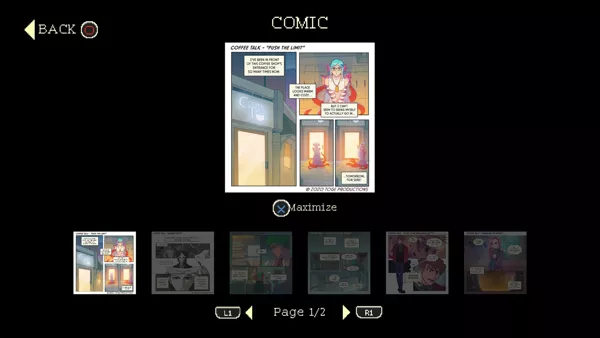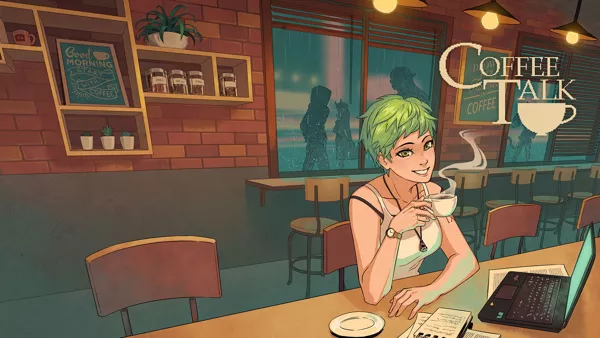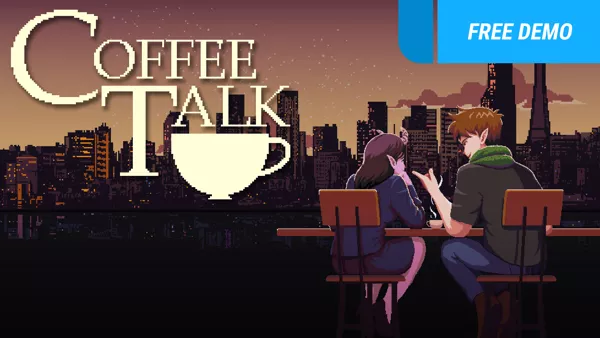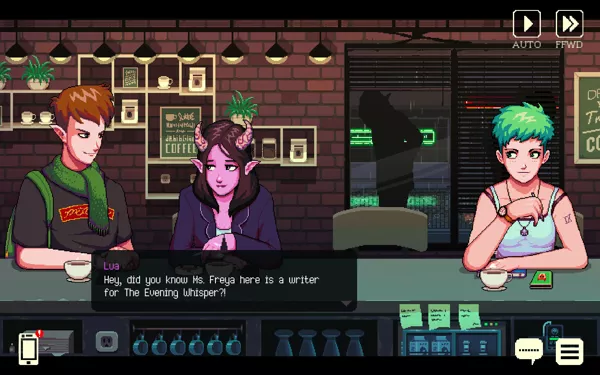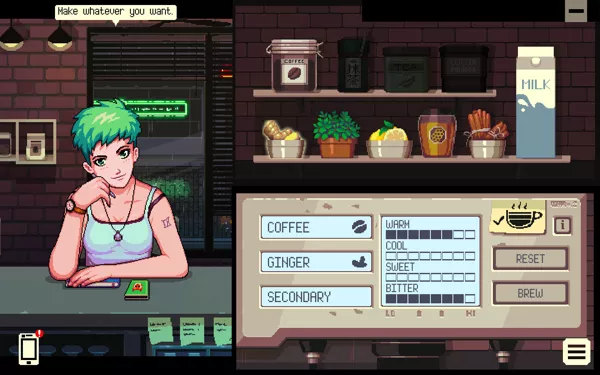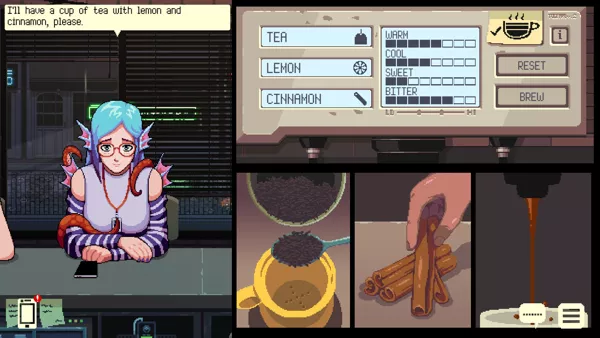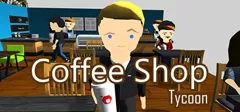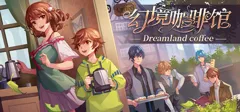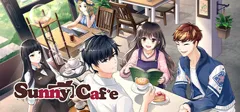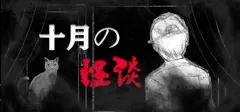Coffee Talk
Official Description (Ad Blurb)
Coffee Talk is a game about listening to people’s problems and helping them by serving up a warm drink out of the ingredients you have in stock. It is a game that depicts lives as humanly as possible, while having a cast that is more than just humans.
Immerse yourself in the stories of alternative-Seattle inhabitants, ranging from a dramatic love story between an elf and a succubus, an alien trying to understand humans’ lives, and many others modern readers will find strongly echo the world around them.
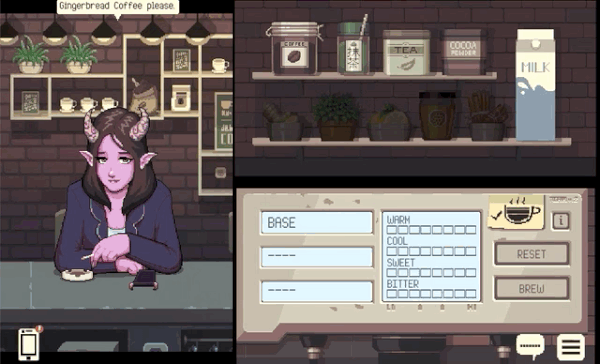
The game features:
* Tales of people from an alternative-Seattle, a city where elves, orcs, mermaids, and many other fantasy races live together with humans in a modern world we will all find familiar
* Branching storylines, where the branches are determined not by the dialogue options you choose, but from how you serve your café customers
* 90’s anime-inspired pixel art visuals and chill vibes-inducing color palette help to immerse you in the game’s world
* Selection of jazzy and lo-fi music to accompany the late night warm drinks and conversations
* An experience to make you think, feel, and rest both your body and your soul
Source: Steam Store Description
Spellings
- コーヒートーク - Japanese spelling
- 咖啡谈话 - Simplified Chinese spelling
Groups +
Screenshots
Promos
Videos
Add Trailer or Gameplay Video +1 point
See any errors or missing info for this game?
You can submit a correction, contribute trivia, add to a game group, add a related site or alternate title.
Credits (Windows version)
76 People (39 developers, 37 thanks) · View all
| Writing | |
| Game Design | |
| Music | |
| Project Management | |
| Art | |
| Programming | |
| Additional Writing | |
| Additional Art | |
| Community Manager | |
| Public Relations | |
| QA | |
| Game Design Support | |
| Toge Productions | |
| CEO |
|
| COO | |
| [ full credits ] | |
Reviews
Critics
Average score: 75% (based on 30 ratings)
Players
Average score: 2.7 out of 5 (based on 12 ratings with 1 reviews)
Shallow talk over hot beverages
The Good
I expected Coffee Talk to be a barista-themed puzzle game with stories. I ended up playing a thoroughly linear visual novel, in which the preparation of beverages has only a very minor impact on the plot. That made it all the more disappointing that neither the content nor the style of the story won me over.
The game revolves around the eponymous coffee bar, which is located in a fictitious version of Seattle and opens only at night. A small group of regular customers meets here for a cup of coffee, tea, or a glass of milk, and unwinds after the challenges of their everyday lives. Players observe the story from the perspective of the café's owner, who remains invisibly behind the counter throughout the game, but can be given a name at the beginning, and is regularly being involved in conversations with the customers.
Even though the game never leaves the setting of the café, its visuals are its strongest point. The pixel look is applied consistently, and it really feels almost like playing a Japanese home computer game of the nineties. The subdued brown and green tones of the café are in a warm contrast to the rainy night that can be seen through the windows. Animations are subtle and fitting, the developers restricted themselves to gentle pans of the camera, and silhouettes passing the café on the streets outside. The characters look particularly great. Also inspired by Japanese animé, they're all excellently drawn, distinctive, but still in a coherent style.
One reason why the characters have such diverse looks is that in this Seattle, humans aren't the only civilised creatures walking around. Players also meet beings from myths and popular fantasy, such as werewolves, vampires, orcs, or cat people. This is also where the narrative problems start to show, because the premise isn't really being made use of.
The Bad
Racism is one of the many big topics the game tries to approach, which could have been done way more effectively in a realistic scenario than with fictitious tensions between succubi and elves. In a few lines of dialogue, one of the main characters of the game, journalist and author Freya, talks about her idea of setting her novel in a fictional world where humans are the only civilised species. The suggestion that humans would still keep looking for differences, no matter how ridiculous, just to find reasons to keep hating each other, is interesting. But it's not pursued further, and remains the only point in the story where the diversity of creatures in this world plays any role.
This disappointing superficiality defines the entire plot. The range of social issues the game dips into is very wide. Among them, the game touches on difficult topics such as the reintegration of war veterans, profiteering in healthcare, global overpopulation, and the exploitation and sexualisation of teenagers in popular culture. However, the game is almost always content to bring up the topic, then dropping it again immediately. Sometimes, an issue is being topped off with a platitude about how nice things could be if people just got their act together. With the exception of the love story, nothing ever leads to a real discussion with actual, differing positions. Coffee Talk unrolls many important topics, but then shies away short of saying anything substantial about them.
Even stylistically, I found the game's writing underwhelming. All characters fulfil their purpose of bringing up certain social problems due to their background, and that's how one-dimensional they remain. You can reduce them down to one sentence describing their main cliché, without any big surprises waiting down the line. The same is true for their ways of expression, which just follow the respective stereotype without giving them any personality. Writing naturally sounding dialogue is difficult, and Coffee Talk doesn't manage to do it.
Being a visual novel, the game only gives players very limited ways of influencing the story. There is no way of changing the course of a conversation directly. The only interactive element is the preparation of drinks. Guests have sometimes vague, sometimes very precise ideas of what kind of beverage they'd like. Whether you serve them exactly what they ordered, or just plunk down a concoction of random ingredients, can decide which outcome their story will have in the epilogue. Apart from that, the only direct consequence for not serving customers what they asked for is that they will complain about it for a sentence or two. They still drink whatever you put in front of them. The lack of ramifications fits the relaxed atmosphere pretty well, though.
Beverages with milk foam can optionally be poshed up with manually drawn latte art. The minigame is nicely animated, but the results have no impact on the satisfaction of the customer, nor the flow of conversation. Irritatingly, here as everywhere else, the game doesn't care whether one is using mouse or keyboard to play, and unashamedly keeps showing Xbox control elements.
The epilogue is the only motivation to repeat the story. If you bungle orders at important points in the game, you're going to miss out on the happy endings of certain plot threads. Apart from this, the story is entirely linear. What's frustrating about this is that it's almost impossible to get all the orders correct on the first try. For most of them, characters drop enough hints for players to discover previously unknown recipes through experimentation. Loading screens showing some of the drinks can give important hints, too, but you have to be lucky to get the right ones. Sometimes, though, you're left completely in the dark and just have to try things out randomly. There's a free play mode where the ten ingredients can be mixed without any pressure, which is a good way to fill gaps in the recipe book, but because preparing a beverage is nothing but clicking on three ingredients in order, it's not a lot of fun, either.
The Bottom Line
Thankfully, the game offers players some help in trying to reveal the missing parts of the story. Episodes can be repeated at any time, although no indication is given about which days might hold crucial turning points. Previously seen dialogue can be skipped in a fast-forward mode. If the preparation of a beverage changes the course of the conversation, this time lapse mode is disabled, so new dialogue isn't accidentally skipped. If anything breezed past too quickly after all, a log records all dialogue of the day. After the end credits, there is also a hint if some plots haven't been brought to their best ending yet.
The story, roughly three hours long, can be fully completed in a couple more hours that way. But given the weak narrative, the question will be whether players deem the effort worth it. A shallow side plot isn't going to turn into an emotional masterpiece through the addition of two new sentences to conclude it.
Aside from the main story, players can also fulfil an endless chain of drink orders in a challenge mode. If they already know how to prepare the beverages, there's no real challenge to it, especially since the recipe book is accessible. If they don't know them, they don't stand a chance anyway and first have to figure out the missing recipes in free play mode.
Ultimately, even the element of preparing beverages isn't really thought through in any of the three modes. It isn't challenging or fun enough to stand on its own, and as a way of influencing the story, it fails to motivate because the story itself isn't interesting.
What Coffee Talk is really good at is creating an atmosphere. The placid colours fit the soft camera pans and the mellow music. There are around two dozen tracks, largely identical-sounding background music of the "chillhop" variety, which really fits the scenario well. The only rather dramatic theme is great, and does a good job at underscoring the intensity of the scene it's used in.
What charmed me most were the little details. The phase of the moon changes with the passing nights. You can use a mobile phone to check on the social media profiles of your regular customers, or read short stories written by one of the main characters for a newspaper. Characters which aren't currently involved in any conversations will pick up their phones when they buzz. Although I was quite disappointed when, according to her social media profile, one of the characters had her birthday, actually visited the café that night and met with her boyfriend, but the birthday wasn't even mentioned. That's what I get for reading in-game texts so observantly: disappointment after disappointment.
I like this fictitious café, I enjoy the calm pace and the subdued atmosphere. The sounds of jingling porcelain, cutting ginger on a wooden cutting board, or a gurgling milk frother, are genuinely relaxing. I would have enjoyed spending time in this game world, if only the stories had been deeper, the characters more interesting, and the preparation of drinks more fun. What Coffee Talk leaves me with most of all is a feeling of unfulfilled potential.
The most lasting effect the game has had on me is that now, I'd really like to try some of the various coffee, tea, and milk specialities it presented. I just tried to prepare my first STMJ, a milk beverage with egg yolk, honey, and ginger, which is very popular in Indonesia, where Coffee Talk was developed. Having such a direct effect on real life – that's a success, too.
Windows · by Daniel Saner (3509) · 2023
Analytics
Upgrade to MobyPro to view research rankings!
Identifiers +
Contribute
Are you familiar with this game? Help document and preserve this entry in video game history! If your contribution is approved, you will earn points and be credited as a contributor.
Contributors to this Entry
Game added by Rik Hideto.
Game added January 29, 2020. Last modified August 2, 2024.
